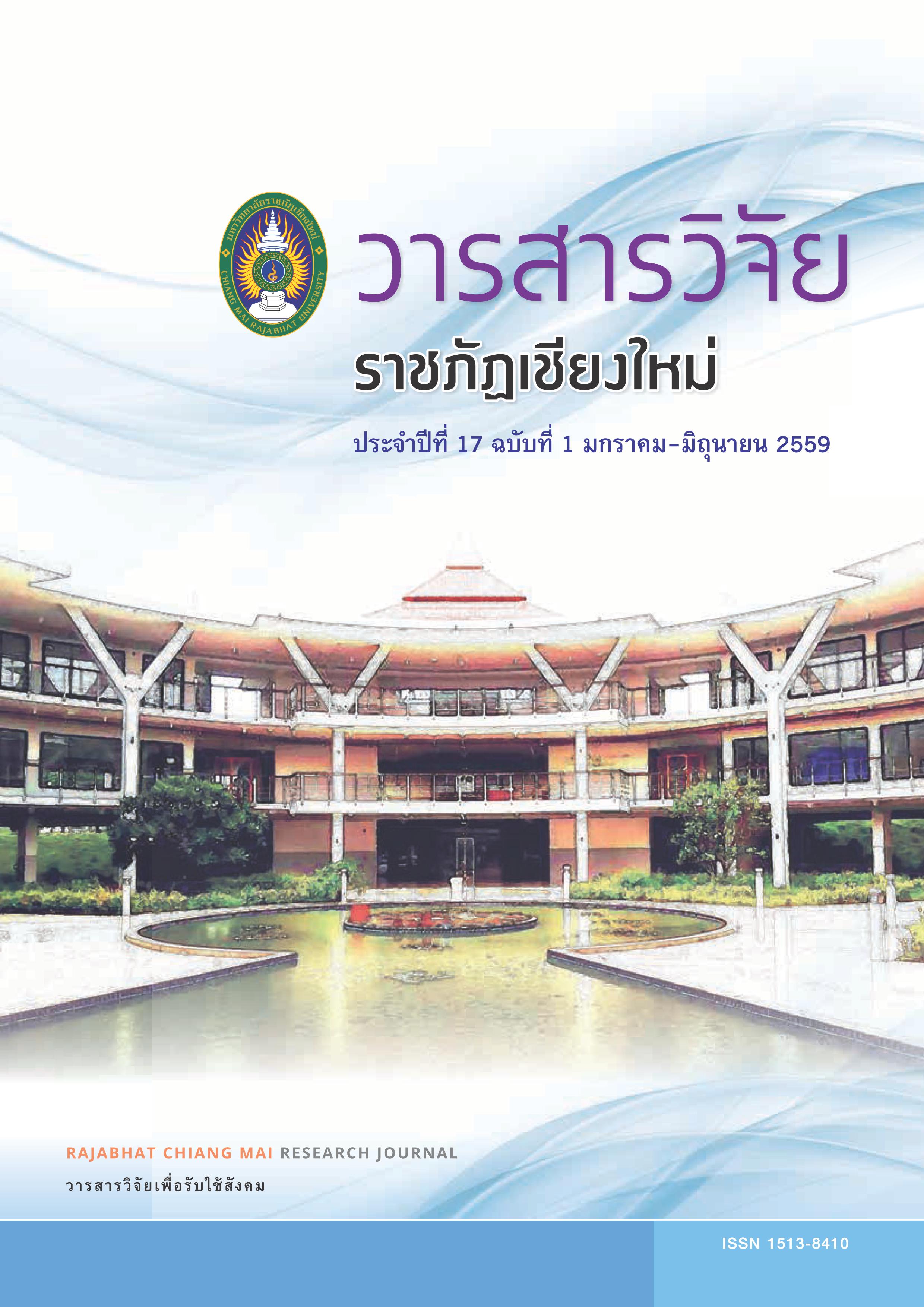Thai Cultural Assimilation through Extra-curricular Activities: A Case Study of Exchange Students at the Institute of International Studies, Ramkhamhaeng University
DOI:
https://doi.org/10.14456/rcmrj.2016.214987Keywords:
Culture, Acculturation, Assimilation, Exchange Students, Extra-curricular ActivitiesAbstract
Newly arrived international students who are participating in their semester aboard may face a lot of difficulties in adapting to the new culture. This study aims at exploring and analyzing German exchange students’ perceptions towards Thai culture, society, people’s way of life and their perception towards the difficulty factors which they encountered during participating in Buddhist-related activities and ceremonies at a rural Dhamma Center. A total of nine German exchange students participated in this study. Data were gathered by means of a qualitative approach including open-ended questions, semi-structured interviews, and reflective reports. The thematic analysis techniques and qualitative data analysis (QDA) software package (NVivo 10) was employed to analyze the data. The finding showed that exposure to such extra-curricular activities had a positive impact on German exchange students’ understanding and perception towards Thai culture, society, and people’s way of life. However, there were two factors which caused exchange students to feel uncomfortable whilst participating in Buddhist-related activities and ceremonies: the Thai language barrier and practicing of the morning chant. These extra- curricular activities appeared to have beneficial effects on German exchange students regarding their cultural adjustment in Thailand. The results of this study might benefit the International Affairs Offices in all Thai tertiary educational institutions in order to enhance opportunities for international students to understand more comprehensively Thai culture, society, and its people.
Downloads
References
Berry, J. W. (2003). Conceptual approaches to understanding acculturation. In K. M. Chun, P. B. Organista, & G. Marín (Eds.), Acculturation: Advances in theory, measurement, and applied research. Washington, DC: American Psychological Association.
Berry, J. W., Poortinga, H. Y., Breugelmans, M. S., Chasiotis, A. and Sam, D. L. (2011). Cross-cultural psychology. 3rd ed. Cambridge: Cambridge University Press.
Carlson, J. A. (2010). Avoiding traps in member checking. The Qualitative Report. (online). Retrieved from http://www.nova.edu/ssss/QR/QR15- 5/carlson.pdf (July 10, 2015)
Ding, N. and Teo, A. (2013). Teachers perceptions of teaching cultural content is Islamic privates schools in five southern border provinces of Thailand. In International Conference Proceedings on Humanities and Social Sciences, Faculty of Liberal Arts, pp. 263-276. Songkla: Prince of Songkla University.
Komin, S. (1990). Psychology of the Thai People: Values and behavioral patterns. Research Center.
National Institute of Development Administration (NIDA), Bangkok.
Kusalasaya, K. (2006). Buddhism in Thailand: Its Past and Its Present. (online). Retrieved from http://www.accesstoinsight.org/lib/authors/kusalasaya/wheel085.html (June 20, 2015)
Mahmood, H. (2014). An Analysis of Acculturative Stress, Socio-cultural Adaptation, and Satisfaction among International Students at a Non-Metropolitan University. Doctoral Thesis in Educational Leadership, Western Kentucky University, Kentucky.
Moran, P. R. (2001).Teaching culture: Perspectives in practice. Canada: Heinle & Heinle.
Oatey, S. H. (2012). What is culture? A compilation of quotations. (online). Retrieved from http://www2.warwick.ac.uk/fac/soc/al/globalpad/openhouse/interculturalskills/global_pad_-_what_is_culture.pdf (July 11, 2015)
Organista, P. B., Marín, G. and Chun, K. M. (2010).The psychology of ethnic groups in the United States. Thousand Oaks, CA: SAGE Publications.
Otlu, F. N. (2010). College adjustment of international students: The role of gender, acculturative stress, coping skills, cultural distance, and perceived social support. Master Thesis in Educational Sciences, Middle East Technical University.
Prathoomthin, S. (2009). Learners’ perceptions of culture through movies. (online). Retrieved from http://e-flt.nus.edu.sg/v6sp12009/prathoomthin.pdf (June 19, 2015)
Theerakittikul, S. (2008).Training and development using Buddhist Teachings and practices in Thai organizations. Doctoral Thesis in Corporate and Executive Development, Northumbria University.
Zhang, Y. (2012). An examination of acculturative stress, perceived social support and depression among Chinese international students. Master Thesis in Child and Family Studies, Syracuse University, New York.
Downloads
Published
How to Cite
Issue
Section
License
1. Articles, information, content, images, etc published in the “Community and Social Development Journal” are copyrighted by the Community and Social Development Journal, Chiang Mai Rajabhat University. In order to properly distribute the articles through print and electronic media, the authors still hold the copyright for the published articles under the Creative Commons Attribution (CC BY) license, which allows the re-distribution of the articles in other sources. References must be made to the articles in the journal. The authors are responsible for requesting permission to reproduce copyrighted content from other sources.
2. The content of the articles appearing in the journal is the direct responsibility of the article authors. The editorial board of the journal does not necessarily agree with or share any responsibility.














